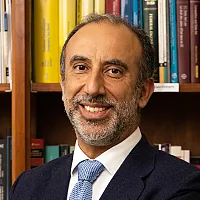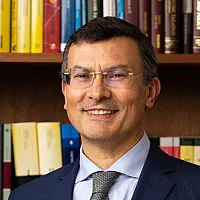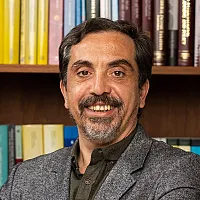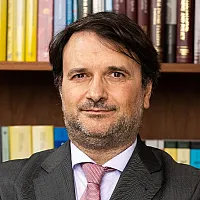Research Groups
Group IV: Economic, Fiscal, Monetary Goverance & the Future of the European Union
The EU is facing new challenges. These have arisen namely due to the war in Ukraine; deglobalization; the return of protectionist measures; sanitary reasons. As so, important reforms can be promoted in the European Union, notably at the EMU (Economic and Monetary Union) level, where the design of new policies and rules has been already considered to be developed in the next years. The group will investigate the future prospectsfor monetary and fiscal policies in the EU, in particularthe prospects for European Economic Governance, including the revision of European fiscal rules and their legal framework.
This group is coordinated by Prof. Dr. Nazaré da Costa Cabral.
Projects
Projects that are being developed by the group:
The “BRIDGE WATCH: values and democracy in the UE and Latin America” aims to analyze the significant developments related to important values in Latin America (LA) and at EU level, both positive and negative, to verify the effective sharing of them between these regions in order to build bridges of dialogue and exchange of best practices with focus on civil society, stakeholders, policymakers and scientific researchers. The EU’s relations with LA are multifaceted and conducted at different levels. Few regions in the world can boast such strong ties, rooted in the joint history, languages, identities and a shared commitment to democracy, human rights, the rule of law and multilateralism. The topicality of the theme is demonstrated in view of recent events that highlight the difficulties faced by democracy around the world and, in particular, in LA, leading this project to analyze the following topics: Rule of Law; Democracy; Human Rights, Dignity and Equality; Digital Transition and Innovative Solutions; Free and Fair Trade towards an Inclusive Economies and Green Transitions and Sustainable Societies.
Specifically, the project foresees 14 outputs, including the creation of the BRIDGE Watch whose result is to send an Annual Report to the European Commission and to the competent national LA authorities containing analysis of data and information about these values collected in ten LA countries, providing a synthesis of significant developments and comparing with the European standards, filling a gap in an empirical study in this area, methodologically planned and scientifically executed, including specific recommendations. Other actions include the consolidation and deepen of some activities already developed under the 620744-EPP-1-2020-1-BR-EPPJMO-NETWORK, such as the Latin American Journal of European Studies, the Observatory on European Studies, the Monograph Contests for young researchers and the promotion of Training Courses and events in differents countries.
This project is Coordinated by Prof. Dr. Nuno Cunha Rodrigues and counts with the participation of more 3 european universities and 10 universities of the Latin America.
Project cofinanced by the European Commission in 1.1 million euros.
Project website: https://eurolatinstudies.com/en/
Participating universities:
University of Lisbon/CIDEEFF (Lisbon) - Coordinator
Federal University of Santa Catarina (Brazil)
University of Seville (Spain)
Pontifical University of Salamanca (Spain)
University of Milan (Italy)
University of Rosario (Colombia)
National University of Trujillo (Peru)
Central University of Ecuador (Ecuador)
Universidad Mayor de San Andres (Bolivia)
National University of Asunción (Paraguay)
Autonomous University of Mexico (Mexico)
University of the Republic (Uruguay)
University of Chile (Chile)
Universidad del Salvador (Argentina)
Duration: 36 meses (2023-2026)
Project status: Ongoing
The future of the EU economic; trade; monetary and fiscal policies
The EU is facing new challenges. These have arisen namely due to the war in Ukraine; deglobalisation; the return of protectionist measures; sanitary reasons.
As so, new solutions must be considered, namely if the field of the EMU; the EU treaties and others in order to find EU new policies that can be considered in the future.
For more project information: https://www.cideeff.pt/en/initiatives/the-eu-and-geopolitics-a-brave-new-world/6368/
Duration: 2025-2029 (48 months)
Project status: Ongoing
The main objective of the research project is to analyse the effects of the 2007-2008 financial crisis and its aftermath on the Portuguese social security system. Bearing in mind that the Constitution of the Portuguese Republic (Article 63) enshrines social security as a universal fundamental right, the project will analyse the effects of austerity in the period of 'adjustment' (2010-2014).
It is also intended to analyse the extent to which the crisis served as a pretext for a reform of the social security system. By calling into question the constitutional rules, have these measures not represented a permanent resizing of social rights and, thus, a reconfiguration of the welfare state in Portugal? Under the pressure of a state of financial need that temporarily suspended and restricted social security rights (in the case of pensions), has this transitional period not been transformed into a new state of normality, with the state of financial exception normalizing?
In partnership with the Centro de Estudos Sociais da Universidade de Coimbra and the Centro de Investigação e Estudos de Sociologia do ISCTE – Instituto Universitário de Lisboa.
Project and results: https://www.cideeff.pt/en/initiatives/art63-social-security-rights-and-the-crisis039-social-retrenchment-as-the-normality-of-the/6346/
Duration: 2017-2022 (60 months)
Project status: Closed
José Maria Castro Caldas
Tiago Oliveira
Clara Oliveira
Frederico Cantante
João Pedroso
Manuel Carvalho da Silva
Nuno Teles
Paulo Pedroso
Pedro Adão e Silva
Renato Miguel do Carmo
Juan Pablo Bohoslavsky
The project aims at analysing the two different crises (the sovereign-debt and pandemic crises) that hit the E(M)U in the last decades, and to discuss the effectiveness and impact of policy responses designed to address them. The Group will investigate future perspectives for monetary and fiscal policies in the EMU, including the evolution of the EU budget, multiannual financial perspectives (MFF), the creation of a fiscal capacity, the own resources system and the financing of the EU budget, and of EU budgetary policy (scope and challenges). In the short term, the group will assess the impact of the Recovery and Resilience Plan.
Project and results: https://www.cideeff.pt/en/initiatives/european-response-to-crisis/6348/
Duration: 2020-2023 (36 months)
Project status: Closed
The object of this project was the mutual dependency relations between employment and social protection.
It aims to answer the following research questions:
1) What are the mechanisms that link employment (unemployment, precariousness, wage decline) to social protection (its responsiveness to increasing demands), and how do the increased pressure on the social protection system, as well as its weaknesses, contribute to increase employment and unemployment risks?
2) How have the articulation of the employment and social protection crises converged in the production and cumulative reproduction of inequalities, and how can this process be reversed by public policies?
Project and results: https://www.cideeff.pt/en/initiatives/employall-the-employment-crisis-and-the-welfare-state-in-portugal-deterring-drivers-of-social/6347/
Duration: 2018-2022 (47 months)
Project status: Closed
Renato Miguel do Carmo
Isabel Roque
Frederico Cantante
Jorge Caleiras
José Maria Castro Caldas
Manuel Carvalho da Silva
Paulo Pedroso
Pedro Adão e Silva
Sílvia Ferreira
Nuno Nunes
Pedro Abrantes
Jean Monnet Chair
The application of EU law considers that an appropriate link with the territory of the Union and the basic principle of territoriality enshrined in public international law must be respected.
However, in some cases, public international law allows states to exercise their extraterritorial jurisdiction. We have found exceptions to the principle of territoriality, namely in the application of the following principles or theories: i) Objective territoriality; ii) Universality; iii) "Effective control"; iv) Nationality; v) "Substantial connection"; vi) Effects.
This phenomenon - which we call "extraterritoriality of EU economic law" - cannot be noticed in different branches of law, such as competition law, food and consumer law, environmental law and commercial law.
Briefly, during this project we were concerned to:
- Understanding the EU's new approach to the territory principle according to EU economic law and the case law of the Court of Justice;
- Understanding how EU economic law is applied and how the acquis communautaire is being received in EU neighbouring countries, notably pre-accession countries;
- Understand the application of EU economic law in third countries;
- Understand how international economic relations pursued by the EU can help promote EU world economic law.
The project integrated the EU Law courses of the Lisbon Law School. An international research network was set up to facilitate debate and knowledge sharing between the countries involved in the project.
Project and results: https://www.cideeff.pt/en/initiatives/territorial-expansion-of-european-union-economic-law/6345/
Duration: 2018-2022 (49 months)
Project status: Closed










